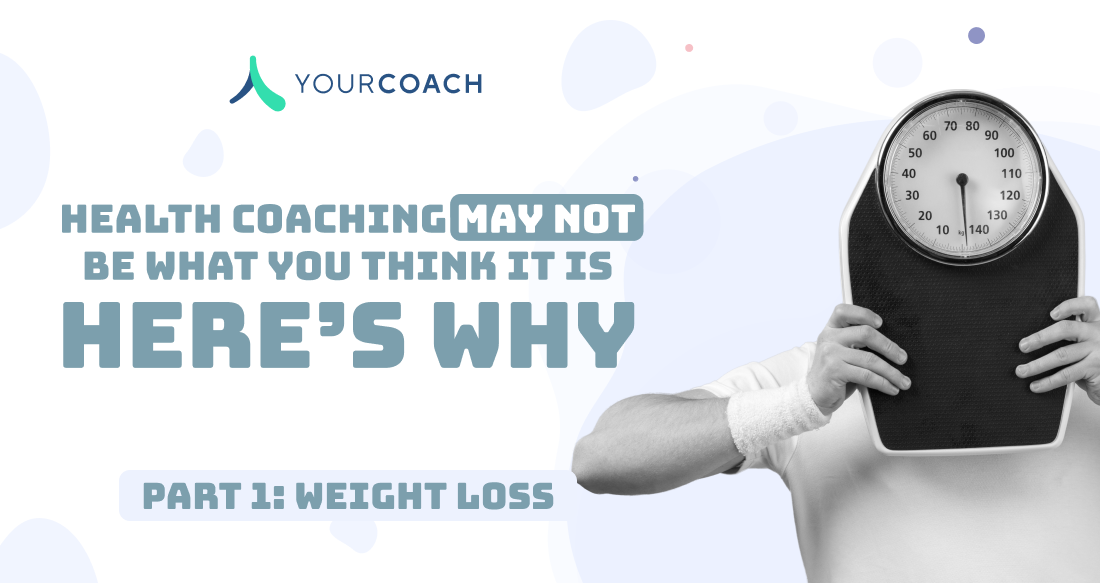
Myth #1 Health Coaching = Weight Loss
We’ve addressed this issue before, but there’s no better time to revisit some of the most common myths and misconceptions around health coaching than the start of a new year! To some, health coaching is a nebulous term; they know health coaches are a helpful resource but aren’t sure what they’re about. Others have the entirely wrong idea of what health coaching is—perhaps thinking it’s an AI-driven chatbot designed to nudge you with broad-strokes, health tips.
Despite the many misconceptions swirling around health coaching, one thing is absolutely true—interest in health coaching is growing rapidly. As we continue to cultivate our Industry Partnerships, with a focus on employer-sponsored wellness in 2024, we find ourselves facing these myths more and more frequently. These conversations are valid and important, especially since more companies in the market are misusing the term “health coaching” without the proper professionals, science or systems to back it up.
Our goal with this series is to unpack several of these misconceptions to help provide more clarity on the powerful work health coaches are doing to transform health and care across the country. Health coaching, in its true essence, is the key to sustainable health change, mitigation of symptoms and risks related to chronic disease, optimal mental health and overall productivity, a better workforce, and, as we like to call it, just Happier & Healthier Humans.
The Half-Truth we’re unpacking today? Health coaching is about losing weight.
The reasoning
PAUSE Now we’re not quite calling this a myth, but rather, a half-truth. Health coaches can and often do help clients with weight loss and weight management—and with massive successes. For example, in a pilot study on health coaching for employees with chronic disease, participants reported “significant weight loss” as the result of working with a health coach. Similarly, a randomized controlled study on the effects of health coaching on weight loss for obese adults resulted in a 16% weight loss for those who worked with a health coach compared to 3% in the control group.
The problem with equating health coaching to weight loss or weight management is that it totally discredits the highly nuanced, individualized and holistic approach health coaches take to achieving health outcomes. Health coaching addresses the whole person, using science-based tactics like open-ended questions and motivational interviewing to get to the heart of what clients are really looking to achieve.
For example, a client might be looking to improve their overall self confidence or address feelings of sluggishness. Health coaches work with them to understand the many life factors that might impact those experiences—this might include weight loss, but also could include better sleep, changes to their diet, or more time outdoors—and work with them to create and maintain actionable habits that make each of these sub-goals happen. In fact, in the first study we shared, weight loss was just one of the many other health outcomes health coaches improved when working with employees. They also increased their exercise sessions, reduced perceived stress, improved sleep and decreased their reported fatigue.
That’s not to say certain health coaches aren’t primarily focused on weight loss-related goals (albeit in a holistic capacity). For example, some coaches partner closely with clients who are prescribed GLP-1 medications for obesity management or weight loss (including well-known semaglutides like Ozempic). Health coaches can be gamechanging when it comes to medication adherence; managing symptoms associated with taking these medications; and adjusting habits post-treatment or as treatment tapers off—providing critical support beyond the doctor’s office, where it’s often needed most.
Not only that, but health coaches also play an important role in supporting individuals suffering with or in recovery from disordered eating. At YourCoach, we work closely with verified and validated health coaches to help them personalize tools like a food diary to avoid potential triggers for those recovering from disordered eating. Whether working with someone who’s looking to lose weight, maintain weight, gain weight, or change their perspective towards food, it’s highly important to ensure you’re partnering with a health coach who’s trained in approaching these relationships tactfully, informed by experience and science; otherwise, an untrained “coach” serving up canned responses can end up doing more harm than good.
The reality
More and more we’re seeing companies promote weight loss programs with support from a “health coach.” We implore you to be wary of these instances. In some cases, these so-called-health coaches might employ one of the very many important tactics required for health coaching to be effective, but without the training, science-backed approach, and data-driven methodologies every health coach is armed with, these individuals are not health coaches. If these “health coaches” aren’t dedicating one-on-one time with clients (this is more than just canned messages with an article about nutrition); engaging in client-driven dialogue to create holistic health goals; leveraging science-backed techniques to troubleshoot and help clients achieve sustainable health habits; and helping them measure success, they are not real health coaches.
At YourCoach, we verify and validate every single health coach who engages in our Industry Partnerships. The benefit to this is that every company that works with us knows their employees, clients or members will receive best-in-class health coaching services driven by the latest data and technology. We work hand-in-hand with employers to make top-notch health coaching services available to their workforce, creating happier, healthier, more productive and more present employees along the way.
If you’re a progressive employer looking to strengthen your workforce through better health, send us a note at team@yourcoach.health to learn about how we can partner with you.


